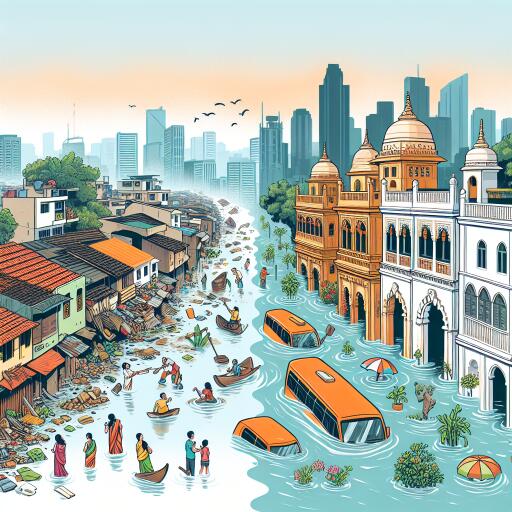
What Pune Floods Are Teaching Us About Building Climate-Resilient Cities
In a world increasingly pitted against the vagaries of climate change, the question of our preparedness for the climate crisis looms large. The recent events in Pune, India, underscore the urgency of this question. The city has been grappling with severe weather conditions, underscored by an alert from the Indian Meteorological Department (IMD) for extremely heavy rainfall. The aftermath has been grim, with several lives lost to rain-related incidents and low-lying areas submerged under floodwaters.
Rescue operations have been in full swing, with the National Disaster Response Force (NDRF) leading the charge in areas like Ekta Nagar, racing against time to mitigate the impact of the flooding. These events are not isolated but are part of a global trend of increasing urban climatic events, which are becoming more frequent and severe.
The Intergovernmental Panel on Climate Change (IPCC) in its sixth Assessment report released in 2022, highlights the stark reality urban areas across the globe face due to climate change. Sea level rise, cyclones, intense rainfall leading to floods, heatwaves, and droughts are all climate risks that urban centers are increasingly vulnerable to. This vulnerability is exacerbated in cities, especially in developing countries, where unplanned urbanization and inadequate infrastructure are rampant.
The situation in Pune serves as a wake-up call for urban planners and policymakers worldwide. It stresses the necessity of building climate-resilient cities that can withstand and adapt to the challenges posed by climate change. Understanding and integrating climate risk into urban planning is no longer optional but a critical need of the hour.
Developing climate resilience involves several key strategies. Firstly, urban development must prioritize climate-smart infrastructure that is designed to withstand extreme weather events. This includes everything from flood defenses to heat-resistant building materials. It also means investing in green infrastructure, such as parks and green roofs, which can help manage floodwaters and mitigate the urban heat island effect.
Moreover, cities need to focus on enhancing emergency response capabilities to ensure swift and effective action in the wake of disasters. This includes not only improving physical infrastructure but also ensuring that communities are educated and prepared to respond to emergencies. Building social resilience is as crucial as strengthening physical structures.
Integrating climate risk into urban planning also means reevaluating and potentially transforming the way cities grow. Encouraging compact, sustainable urban development can reduce the sprawl that often leads to increased vulnerability to climate events. Emphasis should be on creating communities that are both environmentally sustainable and economically robust, ensuring they can rebound and thrive after adverse events.
The Pune floods highlight wider issues of climate risk in urban areas and emphasize the urgency with which we must act to safeguard our collective future. Cities must lead the way in adopting innovative solutions and policies that align with the principles of sustainability and resilience. The task is monumental, but the cost of inaction is far greater. As the frontline of humanity’s battle against climate change, urban areas must transform to become bastions of resilience, protecting the lives and livelihoods of millions who call them home.
Building climate-resilient cities is an investment in our future. It is a commitment to creating urban spaces that not only survive but thrive in the face of climate change. The lessons learned from the Pune floods and similar events worldwide must inform and inspire a new paradigm of urban development. A paradigm where resilience, sustainability, and community go hand in hand in crafting the cities of tomorrow.





Leave a Reply